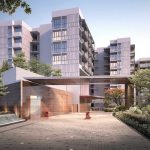BSD: In Singapore, Buyer’s Stamp Duty (BSD) is payable for both residential and non-residential property. The current BSD rate is up to 3% of the purchase price* for residential properties $1m and below, and up to 4% for residential properties that are more than $1m. BSD for non-residential properties are up to 3%.

Image: Inland Revenue Authority of Singapore, by Paul Ho, iCompareLoan.com
ABSD: The Additional Buyer’s Stamp Duty (ABSD) was first introduced in 2011 as part of cooling measures, and is paid together with the BSD. This ABSD, which can range from 5% to as much as 25% of the purchase price*, is based on the profile of the purchaser, i.e. nationality and whether the purchaser already owns residential property in Singapore. Both BSD and ABSD are payable within 14 days of the date of purchase or acquisition of the property, i.e. exercise of the Option to Purchase, signing of the Sale & Purchase Agreement, or the date of transfer.
Current ABSD rates (for purchases after 6 July 2018)
Profile of buyer 1st property 2nd property 3rd and subsequent property
Singapore Citizen (SC)** N/A 12% 15%
Permanent Resident (PR) 5% 15% 15%
Foreigner (FR) 20% 20% 20%
Entity e.g. company** 25% 25% 25%
*Purchase price or valuation, whichever is higher.
**Under Free Trade Agreements, Nationals and Permanent Residents of Iceland, Liechtenstein, Norway or Switzerland and Nationals of the United States of America will be treated as Singapore Citizens for this purpose.
***A property developer will pay a further 5% ABSD upfront, which is not remittable.
Liability and calculation of ABSD
Where there is more than 1 purchaser, ABSD is calculated based on the higher rate applicable, e.g. a PR-FR couple purchasing their first property will be subject to ABSD of 20%.
ABSD is calculated based on the full purchase price, not the proportion property owned, e.g. if you are liable to pay ABSD, it is calculated on the full purchase price even if you only own 1%.
In addition, as long as you own any interest in a residential property, that property will be included in the count of properties owned by you. E.g. If you own just 1% of a property with your siblings and decide to buy another property, ABSD will be payable.
However, there are certain situations where BSD/ABSD may be remitted or is not applicable. Property purchasers should take note of any remissions that are applicable to their situation.
Common Stamp Duty Remissions
Stamp Duty (Spouses) (Remission of ABSD)
This remission is applicable to married couples in two main situations:
(I) SC-PR or SC-PR couples who are married and purchasing their first property jointly
They are eligible for remission of the ABSD at stamping, so that the ABSD does not need to be paid. Note that this remission is not applicable for SC-PR or SC-PR couples that purchase a second property; they are subject to the higher applicable ABSD rate.
(II) Singaporean married couples (at least one is a SC) purchasing their second property jointly
They are eligible for remission of the ABSD if they are able to dispose of the first property within the required timeline (see below), provided they:
i. have already paid the ABSD at the purchase of the second property;
ii. remain married during this time;
iii. there has been no change of ownership for the second property, i.e. they have not sold the second property on; and
iv. apply for the remission within 6 months of disposal of the first property.
The remission is effected as a refund from IRAS.
The required timeline is 6 months from:
• the date of purchase of the second property for completed property; or
• the issue date of the Temporary Occupation Permit (TOP) / Certificate of Statutory Completion (CSC), whichever is earlier, if the property was uncompleted at the time of purchase.
However, in view of the impact of the COVID-19 pandemic, the Government announced on 6 May 2020 that the required timeline will be extended from 6 months to 12 months, provided:
(a) the second property was purchase on or before 1 June 2020; and
(b) the original 6-month deadline expired on or after 2 February 2020.
Stamp Duties (Matrimonial Proceedings) (Remission) Rules
BSD and/or ABSD may be remitted upon the transfer of the property if this transfer is the result of complying with an Order of Court for the division of matrimonial assets in a divorce, and if the property to be transferred is from one party in the divorce proceedings to another, and/or to any child/children of the marriage.
Stamp Duties (HDB Flats and Executive Condominium Units) (Remission of ABSD) Rules
Eligibility to purchase HDB flats and EC units is assessed by HDB. Where HDB has granted approval, ABSD is automatically remitted for any SC ownership (where at least one of the purchasers is SC).
Transfer of property by way of assent to the beneficiaries in accordance to the Will, Intestate Succession Act or Muslim Law of Inheritance
If you are a beneficiary of a will where property has been willed to you, no stamp duty (BSD and ABSD) is applicable when that property is transferred to you. However, that inherited property will be counted as one of the properties owned by you. If you purchase another property subsequently, the new purchase will be counted as your second (or third) property for the purposes of calculating the ABSD applicable.
Transfer of property from trustee to beneficial owners or vice versa where there is no change in the beneficial ownership.
If you are the beneficial owner of trust property, no stamp duty is payable when the property is transferred to you as the legal owner (in additional to your beneficial ownership). This is because stamp duty was already paid when the property was first acquired with you as the beneficial owner. However, this property will be counted as one of the properties owned by you (whether it has been transferred or not) for the purposes of assessing your ABSD liability in subsequent purchases.
Need some advice? Contact our lawyer Ms Ong Li Ling at 63275764 of ASCENTSIA LAW CORPORATION located conveniently at 10 Anson Road #03-22 International Plaza Singapore 079903 (Tg Pagar MRT) or contact us HERE.
The contents herein do not constitute legal or other professional advice
or an opinion of any kind and should not be relied upon as such.
Accessing or using this web site does not create a lawyer-client
relationship. Formal legal advice should be sought in particular
matters.
Read about property tax here
https://www.icompareloan.com/property-tax-singapore/






